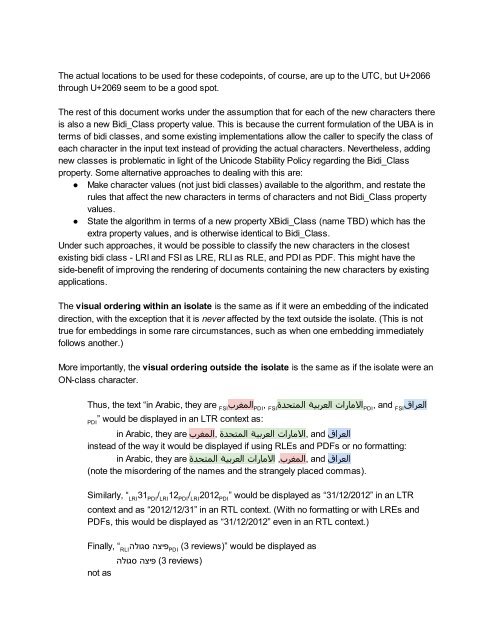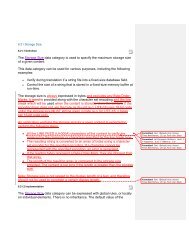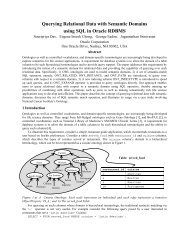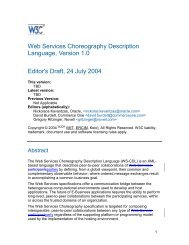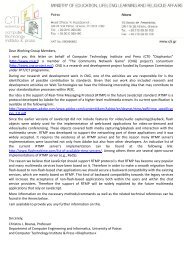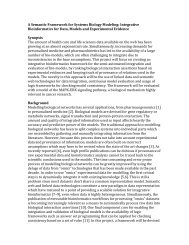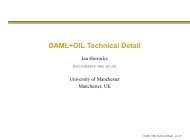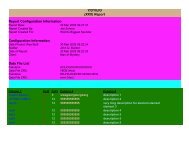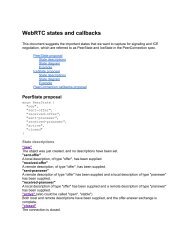A Proposal for Bidi Isolates in Unicode
A Proposal for Bidi Isolates in Unicode
A Proposal for Bidi Isolates in Unicode
Create successful ePaper yourself
Turn your PDF publications into a flip-book with our unique Google optimized e-Paper software.
The actual locations to be used <strong>for</strong> these codepo<strong>in</strong>ts, of course, are up to the UTC, but U+2066<br />
through U+2069 seem to be a good spot.<br />
The rest of this document works under the assumption that <strong>for</strong> each of the new characters there<br />
is also a new <strong>Bidi</strong>_Class property value. This is because the current <strong>for</strong>mulation of the UBA is <strong>in</strong><br />
terms of bidi classes, and some exist<strong>in</strong>g implementations allow the caller to specify the class of<br />
each character <strong>in</strong> the <strong>in</strong>put text <strong>in</strong>stead of provid<strong>in</strong>g the actual characters. Nevertheless, add<strong>in</strong>g<br />
new classes is problematic <strong>in</strong> light of the <strong>Unicode</strong> Stability Policy regard<strong>in</strong>g the <strong>Bidi</strong>_Class<br />
property. Some alternative approaches to deal<strong>in</strong>g with this are:<br />
● Make character values (not just bidi classes) available to the algorithm, and restate the<br />
rules that affect the new characters <strong>in</strong> terms of characters and not <strong>Bidi</strong>_Class property<br />
values.<br />
● State the algorithm <strong>in</strong> terms of a new property X<strong>Bidi</strong>_Class (name TBD) which has the<br />
extra property values, and is otherwise identical to <strong>Bidi</strong>_Class.<br />
Under such approaches, it would be possible to classify the new characters <strong>in</strong> the closest<br />
exist<strong>in</strong>g bidi class - LRI and FSI as LRE, RLI as RLE, and PDI as PDF. This might have the<br />
side-benefit of improv<strong>in</strong>g the render<strong>in</strong>g of documents conta<strong>in</strong><strong>in</strong>g the new characters by exist<strong>in</strong>g<br />
applications.<br />
The visual order<strong>in</strong>g with<strong>in</strong> an isolate is the same as if it were an embedd<strong>in</strong>g of the <strong>in</strong>dicated<br />
direction, with the exception that it is never affected by the text outside the isolate. (This is not<br />
true <strong>for</strong> embedd<strong>in</strong>gs <strong>in</strong> some rare circumstances, such as when one embedd<strong>in</strong>g immediately<br />
follows another.)<br />
More importantly, the visual order<strong>in</strong>g outside the isolate is the same as if the isolate were an<br />
ON-class character.<br />
Thus, the text “<strong>in</strong> Arabic, they are FSI<br />
PDI المغرب<br />
, FSI<br />
PDI الامارات العربیة المتحدة<br />
, and FSI<br />
العراق<br />
PDI<br />
” would be displayed <strong>in</strong> an LTR context as:<br />
العراق and ,الامارات العربیة المتحدة ,المغرب <strong>in</strong> Arabic, they are<br />
<strong>in</strong>stead of the way it would be displayed if us<strong>in</strong>g RLEs and PDFs or no <strong>for</strong>matt<strong>in</strong>g:<br />
العراق and ,المغرب, الامارات العربیة المتحدة <strong>in</strong> Arabic, they are<br />
(note the misorder<strong>in</strong>g of the names and the strangely placed commas).<br />
Similarly, “ LRI<br />
31 PDI<br />
/ LRI<br />
12 PDI<br />
/ LRI<br />
2012 PDI<br />
” would be displayed as “31/12/2012” <strong>in</strong> an LTR<br />
context and as “2012/12/31” <strong>in</strong> an RTL context. (With no <strong>for</strong>matt<strong>in</strong>g or with LREs and<br />
PDFs, this would be displayed as “31/12/2012” even <strong>in</strong> an RTL context.)<br />
F<strong>in</strong>ally, “ RLI<br />
PDI פיצה סגולה<br />
(3 reviews)” would be displayed as<br />
not as<br />
reviews) 3)פיצה סגולה


